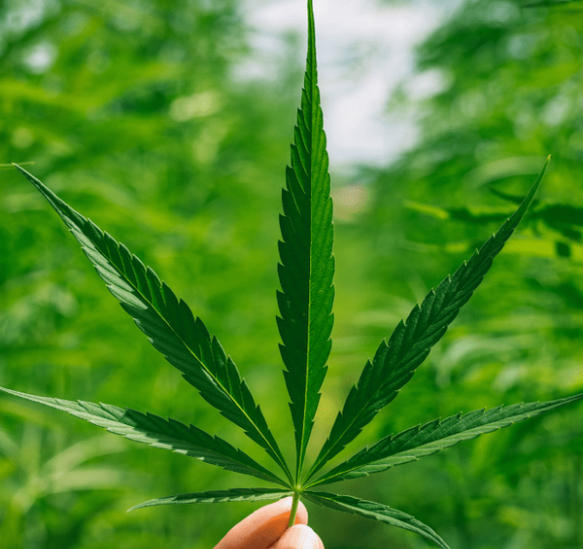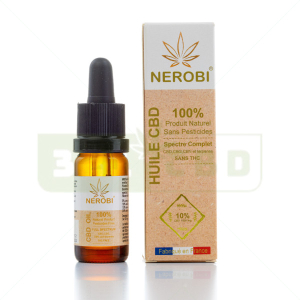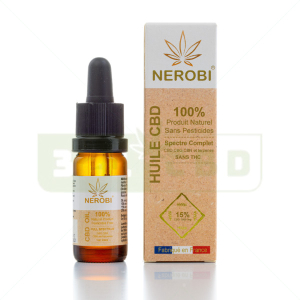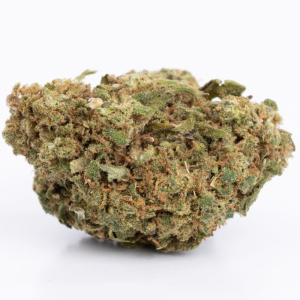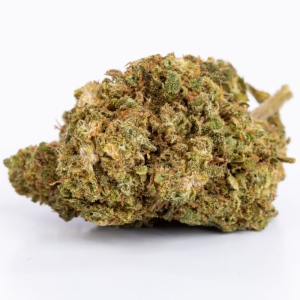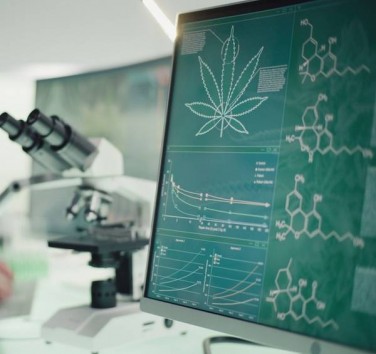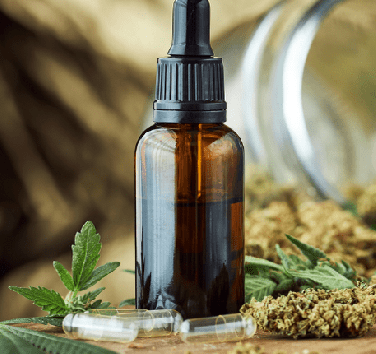In this practical guide, we invite you to explore the origins of HHCP, its properties, its legal status in France and the position of our online store regarding its marketing. So, prepare your CBD herbal tea, sit back, and let us tell you the story of HHCP!
What is HHCP?
HHCP, or hydroxyhexahydrocannabinol, is the latest trendy cannabinoid! Sometimes wrongly considered as a synthetic molecule, HHCP is in reality a metabolite: it is not created in the laboratory by chemical synthesis. It is rather the result of a biological process that can be reproduced in vitro, but also in the human body, with the transformation of Δ9-THC (Δ9-tetrahydrocannabinol), which is the main psychoactive compound in cannabis.
The HHCP training process is carried out in several stages. Initially, Δ9-THC is metabolized to Δ9-THC-COOH (11-nor-9-carboxy-Δ9-tetrahydrocannabinol acid) by cytochrome P450 enzymes, a class of enzymes widely involved in drug metabolism and toxic substances in the body. Δ9-THC-COOH is then transformed into HHCP. For this process to be completed, two conditions must be met: sufficient heat and an acidic environment.
Therefore, HHCP can be formed when cannabis is heated, such as when cooking cannabis edibles or vaporizing, or when exposed to an acidic environment, such as that in our stomach!
For our chemist friends and other cannabinoid genesis enthusiasts: HHCP is a cyclic ester of the acid Δ9-THC-COOH, which means that it is formed by a reaction between a hydroxyl group (-OH ) and a carboxyl group (-COOH) on the same molecule of Δ9-THC-COOH, resulting in the formation of a ring and the release of a water molecule.
Structurally, HHCP is a penta-cyclic phytocannabinoid, just like Δ9-THC. However, its structure is modified by the presence of an additional ester ring, which gives it a three-dimensional shape slightly different from that of Δ9-THC and which explains its slightly different effects from those of THC, as we will see in the following parts.
Please note: the affinity of HHCP with the CB 1 receptors of our endocannabinoid system is more than 30 times greater than that of its cousin, HHC, which was banned in France on June 13, 2023. The fact that it is composed of hydrogenated delta-8 oil and a molecular chain of 7 carbon atoms makes all the difference. Because thanks to this unique structure, HHCP has a kind of “VIP Pass” to interact with the central nervous system, both to express analgesic, anti-inflammatory, antioxidant and relaxing properties, but also psychotropic effects. We will talk about it below.
.png)
HHCP: a short history lesson on this cannabinoid
The history of HHCP begins in 1947, with the American chemist Roger Adams. The latter had succeeded in transforming Delta 9 THC into HHC by adding hydrogen molecules, a process known as hydrogenation.
This change not only changed the molecular weight of the cannabinoid. It also made it much more stable... an advance which encouraged other research in this field, in particular to evaluate the interest of the cannabinoids of the hemp plant, in this case the Cannabis L. Sativa variety, in pain management (as an alternative to opioid medications, which are highly addictive) but also the treatment of certain neurodegenerative pathologies such as multiple sclerosis, Parkinson's and Alzheimer's.
It is this same hydrogenation process that has been applied to other cannabinoids of the hemp plant to produce THCP, THCV, etc. This “new wave” of cannabinoids never reached the general public until the end of 2020, when the Court of Justice of the European Union (CJEU) authorized for the first time the marketing and consumption of cannabinoid products. CBD without THC (less than 0.2% at the time, and less than 0.3% today). These new cannabinoids were therefore introduced onto the French market, with producers and resellers surfing a legal gray area.
HHCP: virtues, but also psychotropic effects
To date, information on HHCP is limited and primarily based on consumer testimonials rather than extensive scientific research. If we rely on the feedback from those who have tested this molecule (discussion forums, social networks, the echoes that reach us from the field), we can consider that HHCP displays the same virtues as CBD, but with effects fairly pronounced psychotropic substances which lead us to strongly advise you not to consume this molecule. Summary:
- Soothing and relaxing effect, with applications against sleep disorders (insomnia), stress, anxiety and panic attacks;
- Analgesic or painkiller effect, particularly to relieve pain associated with arthritis, multiple sclerosis and convulsions;
- Antioxidant action, with neutralization of free radicals responsible for premature cellular aging;
- Anti-inflammatory effects, whether on the muscles, joints or skin, with applications in inflammatory pathologies such as psoriasis, eczema, etc.
As with other cannabinoids resulting from a hydrogenation process, HHCP is the subject of studies to evaluate its potential in slowing the growth of cancer cells and limiting the formation of blood vessels that cause them. nourish. It is also considered in the treatment of patients suffering from neurodegenerative pathologies and epilepsy. Although the initial findings are promising, in-depth and more rigorous studies still need to be conducted to validate these hypotheses.
But there is a (big) downside: HHCP produces psychotropic and euphoric effects, which raises many concerns about its use by the general public. And this is also why we have NEVER offered products rich in HHCP for sale on 321CBD, even when it was legal.
In truth, the HHCP still remains very little explored, and certainties are rare. Therefore, our knowledge about these effects comes more from testimonials from CBD consumers rather than from scientific studies. What do we know about the body’s reaction to consuming a dose of HHCP? Small summary:
- Consumers describe HHCP as a stronger version of HHC;
- The effects of HHCP appear several hours after taking it;
- Beyond the psychotropic and euphoric effects, HHCP causes numerous side effects, first and foremost a feeling of hunger, dry mouth, intense thirst and above all a risk of paranoia. Here we find the side effects of recreational cannabis;
- Even after the felt effects wear off, HHCP remains active in the system for a more prolonged period. Since it is a fat-soluble molecule, it will be stored in the body's fatty tissues, which makes its elimination much slower, sometimes over several weeks.
.png)
Is HHCP dangerous for your health?
The question of whether HHCP is dangerous generates much debate, particularly when it comes to the effects of HHCP. When it comes to the side effects of HHCP, it is essential to remember that each individual may react differently. Some consumers report moderate effects after taking derivative products such as HHCP gummies, while others may experience discomfort, reinforcing concerns about the danger of HHCP.
In some European countries, such as Spain, HHCP is permitted. This authorization suggests that the consumption of this molecule may be safe under certain conditions. However, like any substance, there are situations where HHCP can be dangerous. Like any active substance, HHCP is not necessarily suitable for everyone and caution is advised, especially for those who have never used it.
In the United States, in California for example, THC is legalized and regulated. This situation highlights the idea that, when consumed judiciously and in appropriate ratios, certain substances can prove beneficial to health. Indeed, American health professionals often recommend balanced ratios of THC and CBD.
This combination is supposed to optimize the beneficial effects of cannabis while minimizing possible side effects. CBD, for example, is known for its anti-inflammatory and anxiolytic properties, while THC can help with pain management and stimulate appetite. When used together in balanced proportions, they can offer a broader therapeutic spectrum, highlighting the importance of a balanced and informed approach to consumption.
In conclusion, although HHCP is authorized in some countries and there are numerous testimonials praising its benefits, it is essential to approach its consumption with caution and to be fully aware of the dangers associated with HHCP. The goal is to ask the right questions and stay informed.
Is HHCP legal in France?
On June 12, 2023, a significant change has taken place on the French cannabinoid market. The National Medicines Safety Agency (ANSM) has in fact classified HHC, as well as its derivatives, in this case HHCP and HHCO, as narcotics. The next day, it became formally prohibited to produce, sell or use these substances, at the risk of facing the wrath of the law in the fight against drug trafficking.
Why this decision? Experts from the Centers for Evaluation and Information on Drug Dependence – Addictovigilance (CEIP-A) studied these cannabinoids and concluded that the risks of abuse and dependence were high, comparable to those of recreational cannabis. And since their chemical structure closely resembles that of delta-9 THC (already classified as a narcotic), their fate has been sealed.
321CBD: why don't we offer HHCP products?
At 321CBD, your health and safety are our priority. As a leading supplier of legal cannabidiol and hemp products in France and neighboring countries, we take this responsibility very seriously.
Our online store shares the concerns of health authorities. We are in favor of banning HHCP and its derivatives. Better: we advocate a change in the legislative paradigm in this area. All cannabinoids should be banned except those that are permitted. The nuance is important because today, the paradigm followed is the following: all cannabinoids are legal until they are banned. The time that elapses between the marketing of a new, unknown cannabinoid and testing and eventual banning by authorities exposes consumers to several risks.
For this reason, we made a conscious choice not to market certain molecules which are still little studied, and this was the case for HHCP before its ban. Even though these molecules may seem lucrative, we prefer to wait for science to give us clear answers, or for the law to rule.
Our commitment is simple: to offer you cannabinoid products of impeccable quality and without psychotic effects. At 321CBD, we are on the side of prudence, ethics and quality, without any compromise.

